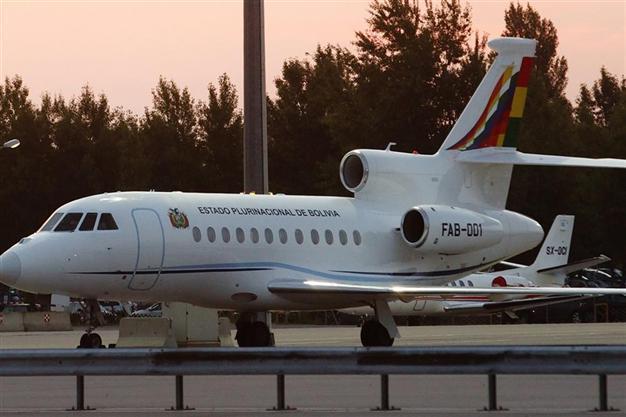Bolivian leader's jet diverted over Snowden suspicions
MOSCOW - Agence France-Presse

The Bolivian presidential airplane is parked at the Vienna International Airport in Schwechat July 3, 2013. Bolivian President Evo Morales' plane was diverted on a flight from Russia and forced to land in Austria over suspicions that Edward Snowden might be on board, as several countries spurned the former U.S. spy agency contractor's asylum requests. REUTERS/Heinz-Peter Bader
Fugitive US intelligence leaker Edward Snowden's struggle to find a safe haven sparked a diplomatic row Wednesday after Bolivia President Evo Morales's plane was diverted to Austria over suspicions he was on board.
The incident happened hours after Morales had said his country would consider a request for political asylum if Snowden submitted one.
Bolivian Foreign Minister David Choquehuanca accused France and Portugal of having denied airspace to the plane, forcing it to reroute over a "huge lie" that Snowden was travelling with Morales.
Bolivian Defence Minister Ruben Saavedra said Italy had also closed its airspace.
"The president was forced to land in Vienna," Choquehuanca told reporters in La Paz, alleging that Morales's life had been put in danger by what he called a forced emergency landing.
"There were unfounded rumours that Mr Snowden may have been on board the aircraft," Choquehuanca said.
Morales had been on a visit to Moscow, where Snowden has been holed up in an airport transit area since June 23. He is seeking to avoid US espionage charges for revealing a vast surveillance program to collect phone and Internet data.
Austrian foreign ministry spokesman Alexander Schallenberg confirmed to AFP that Morales's plane had landed in Vienna and that Snowden was not on board.
"President Morales will leave early Wednesday morning for La Paz," the Bolivian capital, he added. Officials at the French foreign ministry and the prime minister's office said overnight they knew nothing about the incident.
Saavedra later told Bolivian state media that France and Portugal had now cleared Morales to continue his journey.
Bolivia is one of 21 nations to which Snowden has applied for asylum, according to the website of the anti-secrecy group WikiLeaks, which helped file the requests.
Morales on Tuesday said he was open to taking in Snowden.
"If there were a request, of course we would be willing to debate and consider the idea," he told Russia's state-run RT television in comments translated from Spanish.
A spokesman for Russian President Vladimir Putin said Tuesday Snowden had withdrawn his application after Moscow made it clear the American would have to stop leaking US intelligence activities if he wanted to stay.
A number of other countries on Snowden's list were quick to either reject his application or give it a cool reaction.
Brazil and Poland rejected Snowden's asylum bid; while an Indian foreign ministry said there was "no reason to accede to the request".
Austria, Finland, Iceland, Ireland, the Netherlands, Norway and Spain gave technical reasons to explain that Snowden's request was invalid. A Chinese foreign ministry spokesman in Beijing said they knew nothing about a bid apart from media reports.
France and Switzerland said they had not yet received an application, while Italy said it was "contemplating" the request.
Germany said the request would be reviewed "according to the law", while Venezuela has expressed support for Snowden.
Latin America outrageVenezuelan President Nicolas Maduro, who like Morales was in Moscow for a two-day energy summit, praised Snowden's actions in leaking information on US spying activities.
"What is happening now should not be -- he never killed anyone or planted any bombs," he said.
Venezuela and regional allies Ecuador, Cuba and Nicaragua have rallied behind Bolivia, voicing outrage over the plane diversion.
"This is an attack against President Morales's life," Venezuelan Foreign Minister Elias Jaua said.
"We express our solidarity with Evo and the brave Bolivian people. Our America cannot tolerate so much abuse," Ecuadorean President Rafael Correa said on Twitter.
The Bolivian presidential palace said protest rallies were already planned outside the embassies of the United States, France, Portugal and Italy.
Snowden has remained quiet and out of sight of reporters since arriving at Sheremetyevo Airport from Hong Kong.
Late Monday, he delivered a blistering attack on the US, accusing Washington of pressuring foreign leaders to refuse him refuge.
But State Department spokeswoman Jen Psaki said Washington was simply telling countries that "Snowden has been accused of leaking classified information".
She added: "He is somebody that we would like to see returned to the United States, of course. And we are hopeful that will happen." Snowden's latest major leak about US spying on EU countries has angered many European governments and threatened to derail preparations for delicate talks on a huge free trade deal between Washington and Brussels.
EU ambassadors are due to discuss the issue in Brussels on Thursday.
